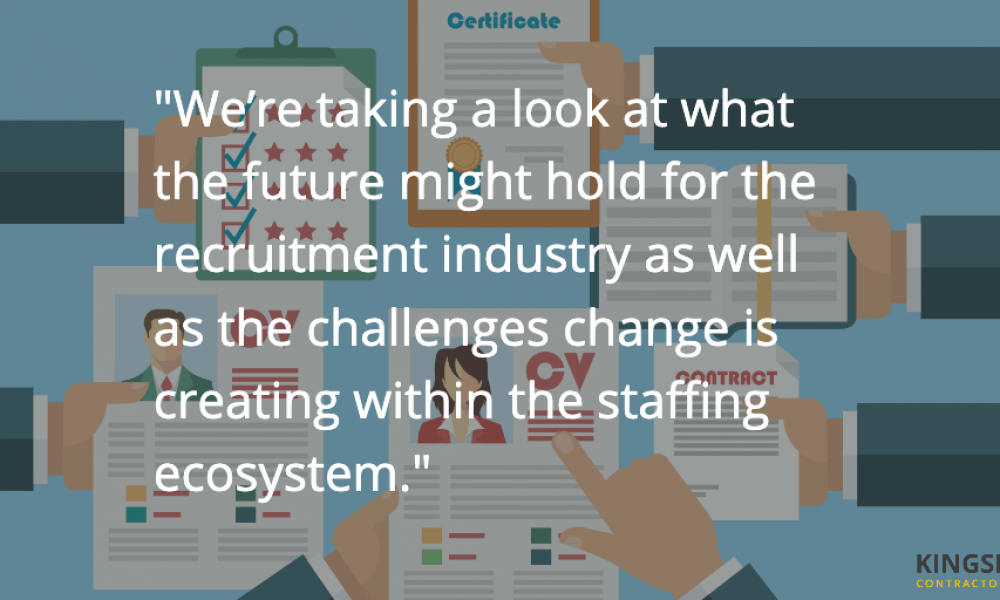In our final piece following on from last year’s Industry Insight event, we’re taking a look at what the future might hold for the recruitment industry as well as the challenges change is creating within the staffing ecosystem. We’ll be borrowing from John Nurthern’s excellent presentation, and if you wish to do further reading there is a wealth of information on SIA.
There has been, and continues to be, a fundamental shift in the way that people are working perhaps more so than at any time since women entered the workforce in large numbers after the war. It could even be said that the freelancer surge is the industrial revolution of our time.
The world is increasingly mobile and on-demand, and so too is an ever-growing segment of the workforce. Accordingly, the staffing industry must adapt. Forward-thinking recruiters in 2019 must have a number of strings to their bow. They need to be able to operate more sophisticated supply chains which cover a wide array of areas, from process outsourcing to payrolling and compliance.
There is also the approaching spectre of encroachment, with large outsider’ companies entering what has traditionally been a rather closed marketplace. The likes of Microsoft (LinkedIn), Google (Google for Jobs), Uber (rumoured to be developing their own standalone freelance platform) and even Ikea (TaskRabbit) are investing heavily in staffing platforms.
The boundaries are being further blurred by the rise of companies like Coople, who are able to provide temporary agency workers with what Nurthern has called the technology efficiencies of a freelance staff provider. The previously sizeable parallels that existed between traditional and online staffing companies are drawing ever closer, with a convergence likely some amalgamation of pure online marketplace and pure service provider into a hybrid model able to shift between the two.
And what about the future of skills? As a recent Oxford Martin School report noted, there will be a sea-change when it comes to the kind of occupations which will be in demand in the future, with the number of workers in up to 20% of fields to shrink. In order to compensate for this, it is essential that the right education systems are in place to help people take on and understand new roles.
The ways in which candidates can be discovered are also much broader than they were previously. It is a case of new opportunities in a new age from online advertising via programmatic ads to social media screening, psychometric assessments, and chatbots. It is crucial that any staffing company with aspirations to be truly at the forefront of the industry has a handle on all of this and more.
As it stands, the working world is sitting on a precipice with any number of developments poised to change traditional work as we know it. Whether it’s artificial intelligence or robotics, quantum computing or the rise of the internet of things, blockchain or big data recruiters must ensure that they remain agile enough to adapt.
The dawning of true automation must also be considered. According to a PWC report, certain sectors are at higher risk of automation than others. Heavily manual and blue-collar jobs transportation and storage, manufacturing, construction are more susceptible than others. PWC suggest that between 40% and 50% of roles in the industries listed above (dynamic real-world situations that require responsive actions) will be lost by the mid 2030s. Once again, the staffing industry must prepare for and account for this looking forward.
But despite all of this, the biggest inhibitor to business growth today will likely be the same in 10 years the scarcity of talent. An SIA Europe Staffing Company Survey noted that 40% of respondents believed talent scarcity was currently their biggest issue, and 63% suggested it would be their main problem a decade from now. As the battle for talent becomes ever more finely poised, recruiters need to be doing more than ever to stand out from the rest of the field.
A successful recruitment company of the future must strike a balance between embracing the technology we now have at our fingertips technology which makes business faster, more efficient, and less costly and the importance of human connection. After all, the staffing industry is ultimately a people business.
Do you feel like you need help adapting to the changes ahead?
Perhaps you just need guidance on the way?
Kingsbridge are experts when it comes to contractors and freelancers, and work with close to 500 of the UK’s best recruitment agencies. If you’d like to find out how we can help you, give us a call on 01242 808740.
